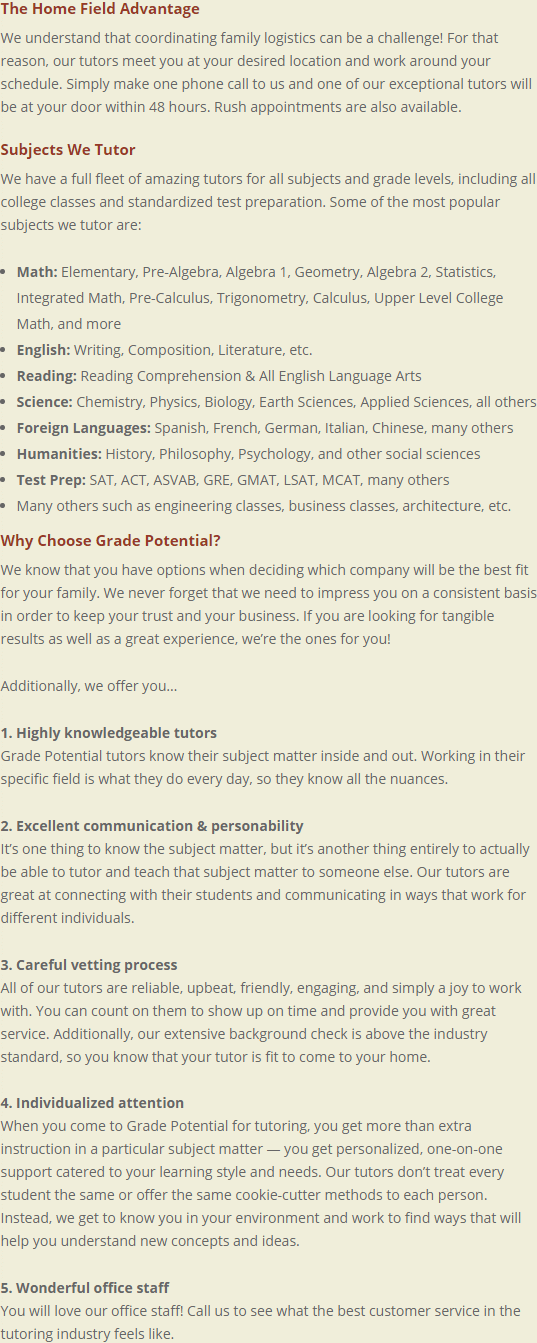
- (412) 701-6045
- (724) 438-8867
(412) 701-6045
Serving Pittsburgh & All Surrounding Areas
Serving Pittsburgh & All Surrounding Areas

Pittsburgh Tutors
Private Tutors in Pittsburgh for All Subjects & Grade Levels
Looking for a great Pittsburgh Tutor? From elementary all the way up to college and graduate school, our experienced team at Grade Potential ensures that you’ll receive the highest quality tutoring on your way to achieving your goals, all at an affordable price! We've worked with thousands of local students, so we know what it takes to be successful around here.
New clients receive a risk-free trial session where you can meet a tutor with no obligation. If you're not thrilled after your first hour, we don't charge you anything! Call us now to learn more and get specific pricing.

Getting Started Is Easy!
Call us now:
(412) 701-6045(724) 438-8867
About Pittsburgh
At the confluence of the Allegheny, Ohio and Monongahela rivers, Pittsburgh, Pennsylvania is the second largest city in Pennsylvania and the 26th largest in the United States. The first inhabitants of the area around what would become Pittsburgh were Native American tribes such as the Shawnee. The Shawnee and their descendants lived in the Ohio River Valley for several hundred years. In the 1600’s they were temporarily uprooted by the Iroquois, but by the time the French and English began trickling into Pennsylvania and Ohio they had returned. They tended to side with those who could offer them the most benefits so they became allies of the French during the French and Indian War. With British victory in that war and in Pontiac’s Rebellion, the Shawnee were permanently expelled from western Pennsylvania, pushed onto reservations or forced to move further west. One of the first European inhabitants of Pittsburgh was Englishman William Trent, who set up a trading post on the rivers to trade furs and merchandise with the Indians and French fur trappers. In 1754, the French, realizing the importance of this river junction, built Fort Duquesne. Only four years later the British General John Forbes and his forces captured the fort and renamed it after British Secretary of State William Pitt. After the American Revolution, Pittsburgh was a frontier town relying on boat building for settlers on the Ohio River and farming.
By the late 1800’s, however, Pittsburgh had become the center of America’s industrial revolution and scores of Irish and Eastern European immigrants had streamed into the city to work in the factories and mills. Pittsburgh became the steel manufacturing capital of the world, garnering the nickname “Steel City.” Andrew Carnegie made his fortune in steel, establishing the Carnegie Steel Company in 1875. Unfortunately, much of this money was acquired on the backs of immigrant workers who pushed out unionized labor by accepting lower wages. These workers were often killed or maimed because of insufficient safety precautions. At the turn of the century, Carnegie sold his steel works to J.P. Morgan for $480 million, making him the richest man in the United States at the time. Whether he felt any guilt over the way he treated his workers is up for debate, but in his later years he made it his mission to give away most of his money, about $350 million to charities and foundations. His money built Carnegie Hall in New York City, the Carnegie Museums in Pittsburgh and Carnegie Mellon University.
It’s likely that a Pittsburgh tutor will keep you ahead of the academic curve so you can escape the books to enjoy the broad variety of things to do in Pittsburgh. The Carnegie Science Center is the most visited museum in Pittsburgh. The center is one of four Carnegie museums located in the downtown. The center’s four floors include the Buhl Planetarium, SportsWorks, the Miniature Railroad Village, the World War II submarine USS Requin and Roboworld, the nation’s largest robotics exhibition. Other Carnegie Museums include the Andy Warhol Museum, the largest museum dedicated to one artist in the nation. The Carnegie Museum of Art features masterpieces from Winslow Homer and James McNeill Whistler. The Carnegie Museum of Natural History has one of the finest collections of dinosaur fossils in the world.
Residents and visitors alike won’t want to miss a ride on the Duquesne Incline, a trolley which transports passengers up Mt. Washington. Riders will be rewarded with a stunning view of the rivers and downtown Pittsburgh below. At night, the skyline comes alive, especially on the north side where both Heinz Field and PNC Park are often illuminated. Named after the French fort which once stood at Point State Park, Duquesne Incline is open Monday through Saturday.
Getting Started Is Easy!Call us now: (412) 701-6045(724) 438-8867
Pittsburgh, PA 15205

